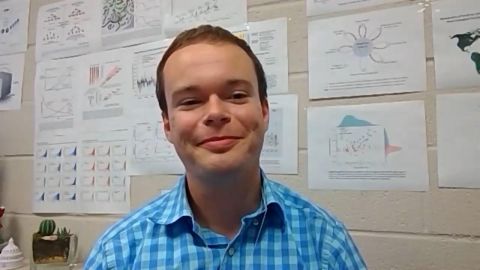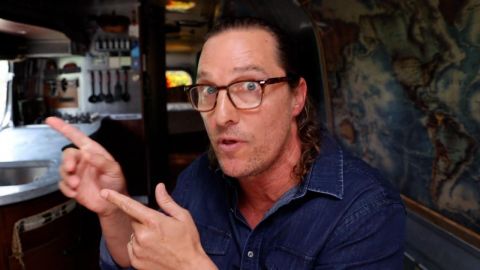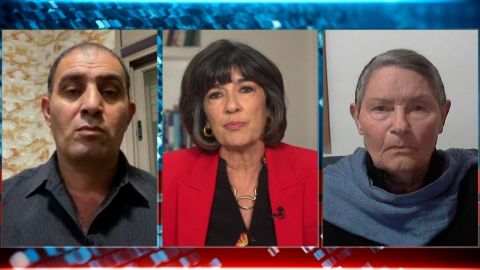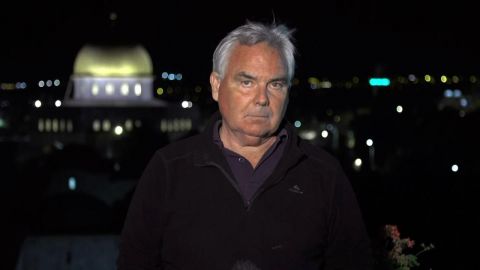Read Transcript EXPAND
CHRISTIANE AMANPOUR: Now, we get an insight into life with autism. Jory Fleming first made headlines as the University of South Carolina student with near perfect
grades. And he has just completed his masters at Oxford University where he was a Rhodes scholar.
His new book is “How to Be Human: An Autistic Man’s Guide to Life.” And here he is speaking to Walter Isaacson.
(BEGIN VIDEOTAPE)
WALTER ISAACSON: Thank you, Christiane. And, Jory, welcome to the show.
JORY FLEMING, AUTHOR, “HOW TO BE HUMAN: AN AUTISTIC MAN’S GUIDE TO LIFE”: Thank you, Walter. It’s great to meet you.
ISAACSON: You’ve written an absolutely beautiful book in which you dig inside your autistic brain to show people what’s hidden. So, tell me how
your brain is different from a typical human brain.
FLEMING: Yes. And, you know, it’s sort of — it’s hard to pin down sometimes because I’d always feel like there’s a sense where it’s difficult
for me to peer into somebody else’s brain. But some of the things that I have noticed are maybe most familiar to people watching like difficulties
with language, difficulty in understanding all of the subtle nuances that come into how people communicate whether that’s body language, whether
that’s their movement with their different various body parts in which there are many to have to keep track of, whether it’s the intonation of
which they speak.
So, not just the words themselves but actually which words they select, the order they select and how they are sounded out. All of that is highly
relevant to nuance conversation. And that’s really not something that I’m not great at.
But there are other aspects of my brain that have been a great benefit to me. And I think these, for me, included the fact that I consider myself
quite a visual thinker, whether it’s my memory that I think has some benefits and abilities, I guess, and surprisingly so in reaching far back
and in bringing up things that are relevant from my past or from past knowledge.
ISAACSON: You said that you’re a visual thinker, does that mean you don’t think in words?
FLEMING: Yes. So, one of the things that I was excited to communicate with the book was how language is something that is almost foreign to me and
that’s because, as you were indicating with your question, you know, I really don’t have words in my brain at all. I consider them really linear
and my brain is, you know, just not very linear. It’s just wired differently I opposed. So, I definitely don’t have any words at all or
language at all in my brain. I have plenty of other stuff, especially visual images, also sounds, experiences, sort of flashes of memory, all
sorts of different things, but I definitely know words for sure.
ISAACSON: Early on in your childhood, you were very troubled in terms of not being able to speak and having emotions that were hard to control. Tell
me how your mother helped move you down the path where eventually you go to college, went to Rhodes Scholarship, go to Worcester College, Oxford and do
all these amazing things.
FLEMING: Yes. You know, my mother has played a crucial role in my life. She’s been my carer, my teacher and many other things. And I think what my
relationship with my mother has made me think on is the fact that in many ways, I’m, I guess, the product of many people caring for me and helping
me. And when I was younger, I was homeschooled. And it was able — I was able to learn an environment that had less of the stimuli that often impair
my ability and cause a great sort of depletion of energy, some people might call that stress, I don’t know what you would call it exactly.
But, you know, even for this interview, I’m turning the fluorescent lights on in my office and I can hear them and it’s horrendous but I have the
capacity to do that in part because I’m excited to have a chance to speak with you. And I think that I have the energy to do that, the capacity to do
that is a direct product of my mother as well as others who’ve made an investment in me and cared about me and want to see me succeed and to be
able to, in turn, show that care for others.
ISAACSON: You talk about how when you got to college there was a manual for people who did orientation, to tell them tricks, ways that they could
engage with incoming students. And when you read it, it was actually a godsend because he was a manual on how you’re supposed to deal with other
people. Tell me how that worked.
FLEMING: This manual you know you mentioned was when I was being a teaching assistant for the first-year seminar class, and a lot of that
class is helping students navigate the transition to college, a new part of their life, a new environment, a new routine. And there was a section that
was about communication and how to have open ended communication. And a lot of that was really helpful in part because it was directing implicit. And
part because I realized it spoke to things that actually could be good at.
And one of those was the importance of listening. And for someone who has great difficulty in creating words out of the space in my mind, the fact
that I don’t have to do that and can actually have a deeper interaction with someone just by saying nothing was an amazing revelation. And I think
since that time, I’ve gotten some comments from friends and colleagues that I’m a decent listener and maybe that’s a function of reading that manual
and being able to say, oh, this is sort of a ranking or a way to sort of actualize some of that hidden context that everybody seems to know by
default.
ISAACSON: In your book I get the sense that emotions are not something that you deeply feel in the way neurotypical person would, but there are
things that you’re able to observe. I mean, you can sense and observe emotions while not feeling them. Is that right? And explain to me what
that’s like.
FLEMING: I think that comes to emotions from a different perspective. And one of the images that I use for that is if some people are in a lake, I
may be on the shore where my feet are in the water but I — mind my head. If that makes any sense. And another, I think, is a register. And, you
know, I think people — you know, when you go to the register of the store, you arrange things up and it always spits out the same amount with the
barcodes.
But what if the register could pop out different amounts when scanning the same barcode? Of course, that’s something that a register is inherently
capable of doing. But if your experience at the register as identical every time, then you may not notice that it could bring up a different thing just
with another few clicks of the keys. And I don’t know of images like that are helpful, but because that’s what my brain relies on to doing own
thinking, that’s how I try to share that with others.
ISAACSON: Most people organize and retrieve information in their heads by having narratives, by making connections between things and turning it into
a story, into a narrative. How do you organize? I mean, you have a lot of information your brain. You’re so smart. You studied geography, you know,
you have a great storage of knowledge. But how do you organize that information in your head since you don’t do it by making the narratives
that some of us do?
FLEMING: Yes. I think, you know, what you speak to is, I think the elements of story building are still in my mind but they’re not — they
don’t have to be arranged in sequence in order to make sense. And, you know, in my book I use a couple different analogies but one that is quite
visual is this concept of Jory beads (ph). And to put things into my mind, they have to be translated into my native space, my native operating
system. But once they’re there, I have the ability to use them in my space in a way that is, I guess, the opposite of linear where I sort of pause up
the beads that are relevant after I decide which ones are relevant and they’re all there.
And I can make patterns or connections between them at random or at will just in so many, and they don’t shift positions, they’re just there because
I’ve sort of truck them out of the memory vault, I guess. And yes. So, I can build stories in my mind and I can vanish them just as quickly to make
a new one, to reverse it, to make it in different directions, to split it in half, to put it in thirds, any of arbitrary division.
And some of that may be a bit of a jumble sometimes. But sometimes it can lead to moments of clarity and then I’ll latch on and go with that. You
know, I’ll translate it back if I need to into words or whatever to continue the conversation.
ISAACSON: Is there something people like myself can learn from the way you process information which is in a less emotional way but perhaps a more
logical way?
FLEMING: I think — you know, I think that — I’ve thought about this a little bit and I don’t think that just because I’m autistic that some of
the ways that I think are out of the range of other people’s brains, if that makes sense. I do think thinking about how you think is not something
that people may be doing on a daily basis. But I think everybody certainly has the ability in a capacity to take moment and say, wait a minute. I
actually do, I think.
You know, what role do words play in my mind, what role does memory play in my mind, how often do I question the output of my own thinking process if
it happens subconsciously or automatically, and whether that’s pausing to ask yourself a question, if you need to use words to do that and maybe
that’s a way to do that. But, you know, if your brain just pops something out of you automatically, you know, anybody can stop and say, OK. What —
you know, where did that came from? You know, why did I think this and not that?
ISAACSON: Oof the breathtakingly beautiful things about this book is how self-aware you teach yourself to be, you become, you understand how your
brain is really working. And one of the things I think it could do for other readers is that even those who are typical brain function, they could
become more self-aware and say, how do I think, how do I form conclusions, how do I create emotions. What tips do you think your book gives to those
of us who want to become more self-aware?
FLEMING: I think you need the desire to see the future and the past, to imagine your relationship to others in a new way. I think that at the end
of the day, you know, recognizing that everybody is unique and everybody has a story to share with others and the value of another person is
something that is so tremendous and it’s almost hard to fathom when you realize that the people you pass on street, they’re all reservoirs of value
that are equal yet distinct from each other’s reservoir that’s passing you down the street. You know, huge percent water and the remaining bit is just
a tremendous amount of value that just sort of crumped into that remaining, you know, percentage.
ISAACSON: I’ve written a book recently on genetic editing and I actually quote you in the book because one of the questions that arises is, if we
ever get the ability to edit human genes so that we could eliminate conditions such as autism, is that something we should do? What’s your
opinion?
FLEMING: Yes. I recently read your book and I don’t know. I didn’t realize that I was going to be in it. So, that was somewhat of a surprise. But I
think that, you know, I’m a very visual thinker. And so, there are many times in your book that you speak about people trying to navigate a path
forward. But, you know, if I’m on a boat with somebody else and they come up to me and they look me in the eye and say, I found a path forward, and
then they push me off the boat, I’m not a fan of that, I guess.
And what saddens me about it is less so the fact that I drowned but more so the fact that the person, whether it’s singular or plural, who decided that
didn’t see me as fully human. And, you know, there’s many complexities in the book, but I think that — and you speak to the importance of
conversations. But I really think that in order to have these conversations, in order to move forward in any meaningful way, you have to
recognize the participants in that conversation as fully human.
ISAACSON: And so, you think that the human species is better off and that if you had the choice to make again, your life is as valuable having autism
as part of it?
FLEMING: Yes. You know, I see value in myself and I hope others see value in me. And I can’t control how other people seem me, but I and share my
life, my experiences and live life, you know. To be a human in the world is something that is tremendously valuable, it’s something that I’m grateful
to have the chance to do, whether my life is long or short, whether the number of people that I meet is small or large, whether my influence on the
world is lasting or temporary, both can be positive and I want to make it positive, and I’m going to try to make it positive.
I don’t know what that means in this sort of large questions that are brought about by the science of editing genes. But, yes, I guess at the end
of the day, I’m person and I’m going to try to enter that space with the experiences and the knowledge that I have in a way that it benefits others.
ISAACSON: Jory Fleming, thank you so much for writing this book and thank you for being with us today.
FLEMING: Thank you, Walter.
About This Episode EXPAND
Violence and unrest in Gaza continue to be reported.
LEARN MORE



